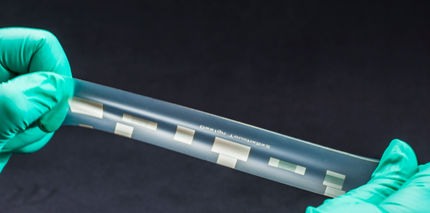WACKER Honors Chemist for Production of Precision Silicone Films
WACKER, the Munich-based chemical group, presented Dr. Andreas Köllnberger with the 2015 Alexander Wacker Innovation Award yesterday. The 41-year-old chemist had developed a process for producing ultrathin silicone films. As thin as 10 micrometers, the precision films are very versatile. Due to their dielectric properties, they are ideal for use in electronics, robotics, sensor systems and medical technology, and enable the development of innovative products. The award ceremony took place during the Group’s annual research symposium at its plant in Burghausen, Germany.
This year was the fourth time that the €10,000 innovation award had been presented for product innovation. Dr. Köllnberger and his team developed a process to produce silicone films that are only 10 to 400 micrometers thick. The high-precision films are extremely uniform, their thickness not varying by more than five percent over their entire area. The production process is fully automated and takes place in a closed system under cleanroom conditions. For the first time, it is possible to produce silicone film of very high quality and purity as roll stock on an industrial scale.
Willems handed over the award during the 43rd R&D symposium, which, as in previous years, was held at WACKER’s main plant in Burghausen, Germany. The 2015 Alexander Wacker Innovation Award attracted entries from 48 employees, including from sites in China, India, Japan and the USA. Examples of the product innovations submitted ranged from a terpolymer for formulating low-emission tile adhesives through to new polyvinyl acetate solid resins for gumbase and a silicone fluid emulsion developed specifically for Asian hair-care products. “This year, the standard was again extremely high,” said Willems. “All submitted product innovations are very promising, with strong profits likely.”
Other news from the department business & finance

Get the chemical industry in your inbox
By submitting this form you agree that LUMITOS AG will send you the newsletter(s) selected above by email. Your data will not be passed on to third parties. Your data will be stored and processed in accordance with our data protection regulations. LUMITOS may contact you by email for the purpose of advertising or market and opinion surveys. You can revoke your consent at any time without giving reasons to LUMITOS AG, Ernst-Augustin-Str. 2, 12489 Berlin, Germany or by e-mail at revoke@lumitos.com with effect for the future. In addition, each email contains a link to unsubscribe from the corresponding newsletter.

























































